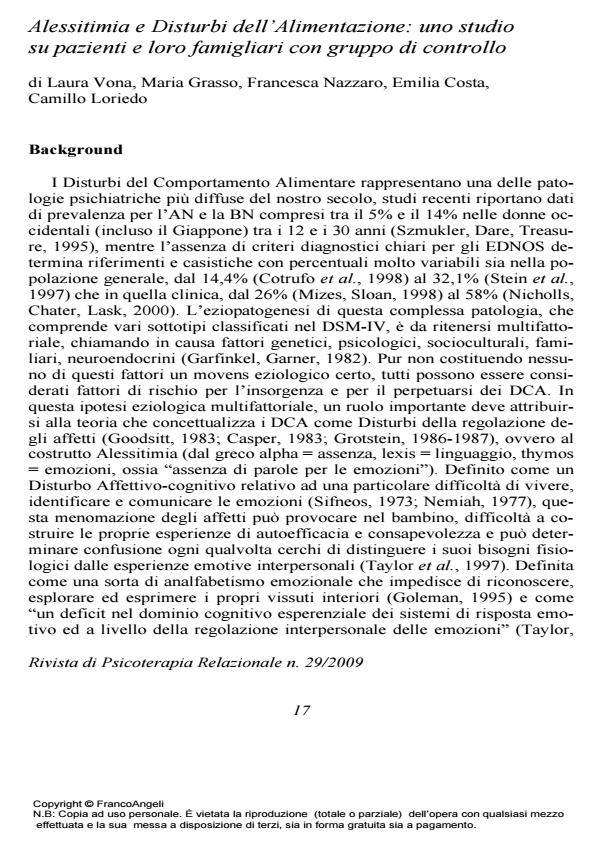Alessitimia e Disturbi dell’Alimentazione: uno studio su pazienti e loro famigliari con gruppo di controllo
Titolo Rivista RIVISTA DI PSICOTERAPIA RELAZIONALE
Autori/Curatori Laura Vona, Maria Grasso, Francesca Nazzaro, Emilia Costa, Camillo Loriedo
Anno di pubblicazione 2010 Fascicolo 2009/29
Lingua Italiano Numero pagine 28 P. 17-44 Dimensione file 916 KB
DOI 10.3280/PR2009-029002
Il DOI è il codice a barre della proprietà intellettuale: per saperne di più
clicca qui
Qui sotto puoi vedere in anteprima la prima pagina di questo articolo.
Se questo articolo ti interessa, lo puoi acquistare (e scaricare in formato pdf) seguendo le facili indicazioni per acquistare il download credit. Acquista Download Credits per scaricare questo Articolo in formato PDF

FrancoAngeli è membro della Publishers International Linking Association, Inc (PILA)associazione indipendente e non profit per facilitare (attraverso i servizi tecnologici implementati da CrossRef.org) l’accesso degli studiosi ai contenuti digitali nelle pubblicazioni professionali e scientifiche
Eating Disorders are characterized by a multifactorial aetiology that includes, according to several authors, the presence of the alexithymic traits in the personality structure of these patients, with the acquisition of dysfunctional familiar comunication pattern. The aim of this study is to appraise the presence of Alexithymia in ED patients and in their parents comparison with control families. 30 subjects with Eating Disorders and their parents and 30 control families have completed the Toronto Alexithymia Scale-20 and the Symptom Check List 90, clinical families were paired for gender, age and social-economic status to a control group. The clinical families are more alexithymic than the control families, revealing moreover some significant psychopathological scales of SCL-90, of which the Depression has the highest correlation with Alexithymia. The presence of alexithymic traits both in parents and in patients confirms the importance of this personality trait in the ED and put in evidence the central role of the family in the in pathogenesis, maintenance and treatment of this diffused pathology.
Parole chiave:Alessitimia, Disturbi del Comportamento Alimentare, Famiglia, Toronto Alexithymia Scale, Symptom Check List 90.
Laura Vona, Maria Grasso, Francesca Nazzaro, Emilia Costa, Camillo Loriedo, Alessitimia e Disturbi dell’Alimentazione: uno studio su pazienti e loro famigliari con gruppo di controllo in "RIVISTA DI PSICOTERAPIA RELAZIONALE " 29/2009, pp 17-44, DOI: 10.3280/PR2009-029002